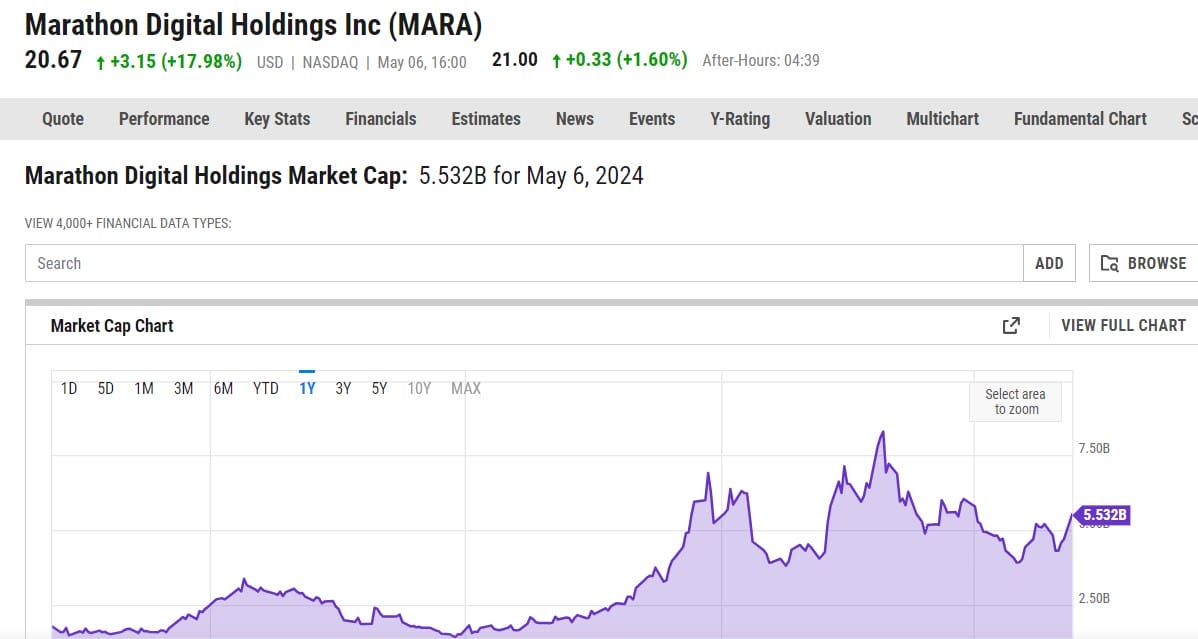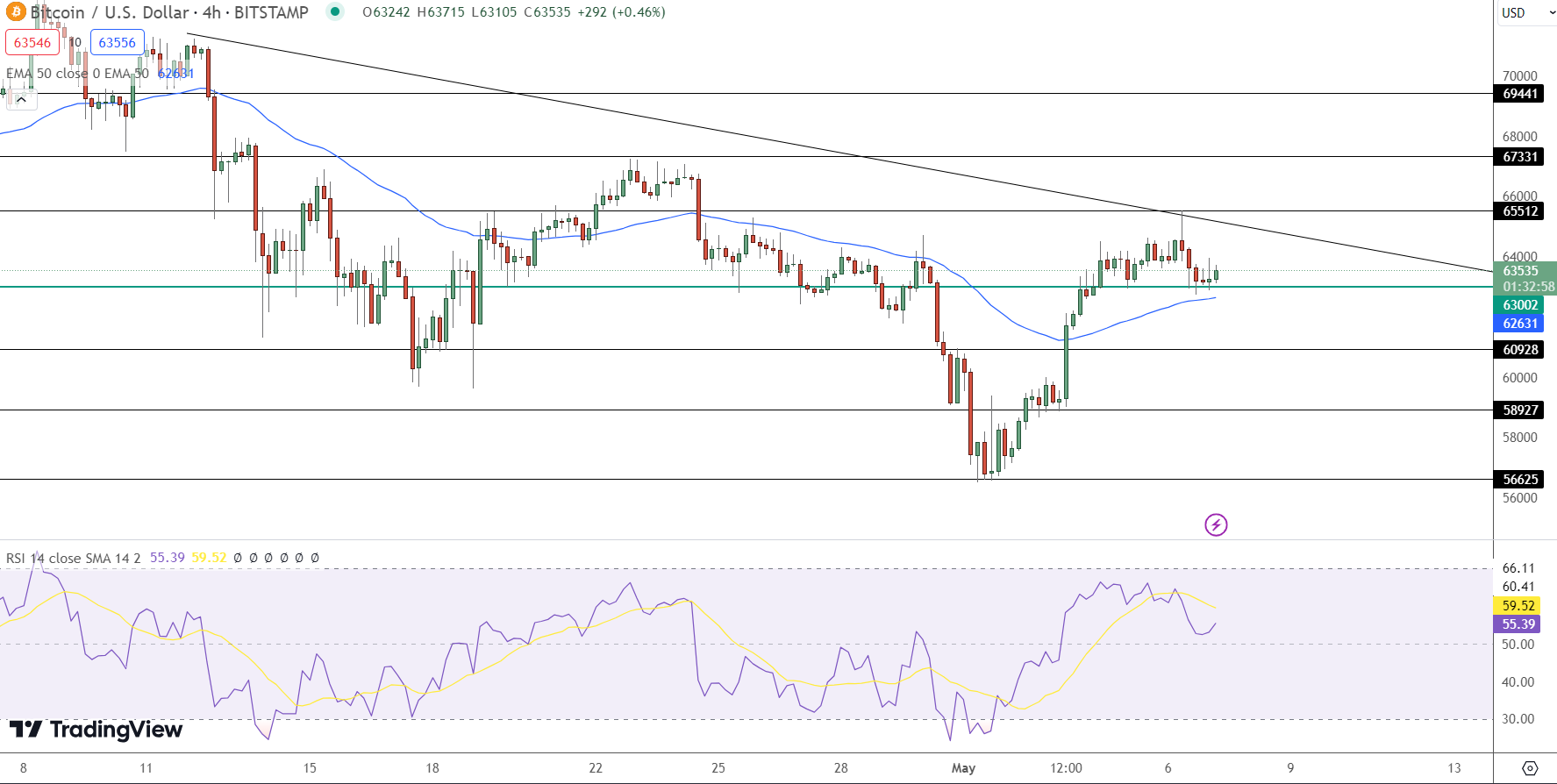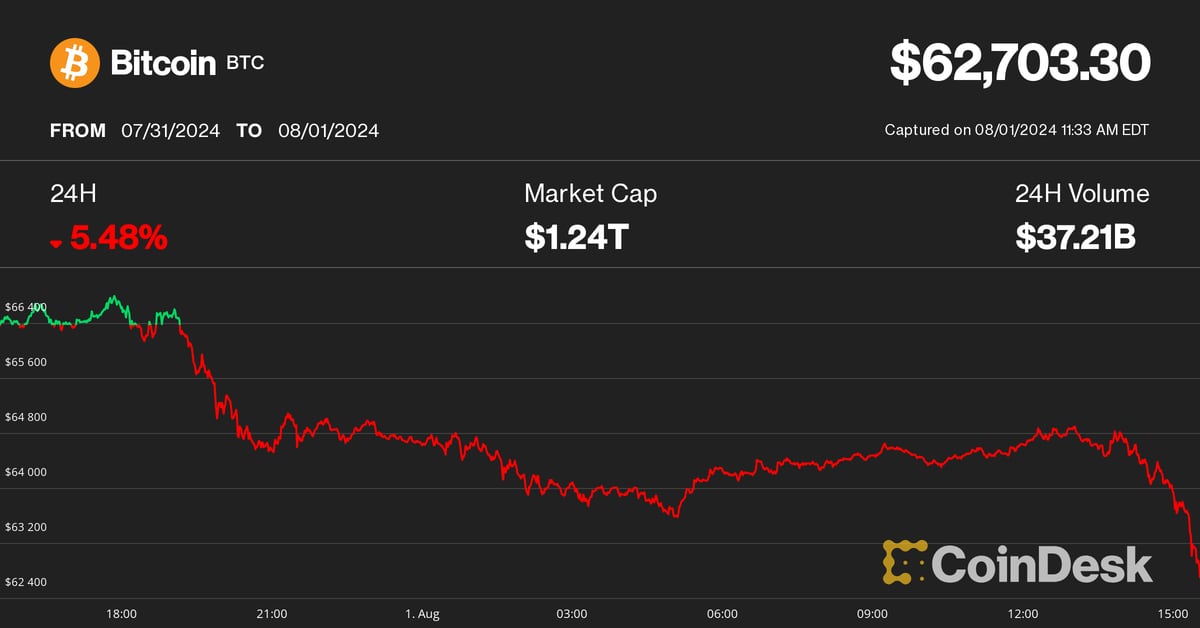Blockchain
It reaches $64,000 on US economic slowdown and rate cut hopes

Last Updated: May 7, 2024 4:47am EDT | 5 minute read
 Bitcoin price prediction
Bitcoin price prediction
Bitcoin failed to continue its upward trend despite multiple supporting factors such as a bearish US dollar and a dovish stance from the Federal Reserve. It lost some of its gains, falling to around 63,400 and hitting an intraday low of 62,961.
While Bitcoin started the week on a bullish note, after falling to a low of $56,000 last week, it rose to $64,000 on Monday, spurred by a colder-than-expected April U.S. jobs report. The report suggests a slowdown in the economy, which could lead to lower inflation and lower interest rates.
However, the price rise was short-lived as BTC fell slightly on Tuesday, likely due to cautious sentiment ahead of a speech by Neel Kashkari, the president of the Federal Reserve Bank of Minneapolis. If his comments take an aggressive tone, signaling a more stringent approach to interest rates, this could strengthen the US dollar and negatively impact BTC.
Marathon Digital Soars 18%: A Lighthouse in Bitcoin Mining Amid Market Uncertainty
Marathon Digital Holdings, a prominent player in the Bitcoin mining industry, recently witnessed an 18% rise in its stock price to $20.67, boosting its market capitalization to nearly $800 million. This significant increase followed the announcement that Marathon would be included in the S&P SmallCap 600 Index, underscoring its growing importance in the cryptocurrency mining industry.
 Marathon Digital Holdings Inc (MARA)
Marathon Digital Holdings Inc (MARA)
Key points:
- Marathon Digital shares rise by 18%, the market capitalization is approaching $800 million.
- Inclusion in the S&P SmallCap 600 highlights its growing importance in the sector.
- The company introduces an executive bonus plan to tie leadership earnings to shareholder interests.
Despite Marathon’s stock success, Bitcoin itself has shown bearish trends, trading around $63,200, reflecting complex sentiment in the broader market. This contrast suggests that while individual companies may thrive, the overall cryptocurrency market remains cautiously optimistic or mixed.
SEC Stalls Ethereum ETFs as Investment Surges in Bitcoin Options
THE The US Securities and Exchange Commission (SEC) postponed its decision to reapprove Ethereum Exchange Traded Funds (ETFs), extending the review period for Galaxy Invesco’s application by an additional 60 days to July 5. This delay continues a trend seen in previous delays affecting major financial players such as BlackRock and Fidelity, raising doubts about a near-term approval due to ongoing regulatory uncertainties. Analysts are increasingly skeptical about the likelihood of Ethereum ETF approval in the current climate.
- Key points:
- SEC Postpones Ethereum ETF Decision, Extending Galaxy Invesco Review into July.
- Historic delays for major applicants such as BlackRock and Fidelity increase regulatory unpredictability.
- In contrast, significant investments in Bitcoin ETFs, such as Hightower’s $68.35 million, highlight a diverging level of trust between Bitcoin and Ethereum ETFs.
As Ethereum faces regulatory hurdles, investment in Bitcoin ETFs is on the rise, with firms like Hightower directing large amounts of capital towards them, underscoring greater market confidence in Bitcoin. This trend suggests that the market may favor Bitcoin over Ethereum amid these regulatory uncertainties, potentially positively impacting the price of Bitcoin in the near term.
Planned Fed rate cuts drive demand for Bitcoin amid a weakening dollar
The recent U.S. labor market report has heightened expectations that the Federal Reserve may cut interest rates later this year, leading to a weaker U.S. dollar and greater attractiveness for Bitcoin. Richmond Fed President Thomas Barkin favors holding current rates to manage inflation, while New York Fed President John Williams suggests potential rate cuts as early as September or November.
Markets now expect a total reduction of 46 basis points by 2024, signaling a shift towards more accommodative monetary policy. This early easing has consequently strengthened Bitcoin’s attractiveness as a hedge against currency devaluation, driving up demand and potentially its price.
- Key points:
- Anticipation of Fed rate cuts weakens the dollar, increasing the attractiveness of Bitcoin.
- Potential rate cuts could amount to 46 basis points by 2024.
- Increased demand for Bitcoin could lead to higher prices.
This growing interest in Bitcoin, spurred by the prospect of lower interest rates, highlights its role as an alternative investment during periods of monetary easing, likely leading to a sustained increase in Bitcoin’s market value.
On Tuesday, bitcoin price prediction looks bullish. The cryptocurrency is currently trading at $63,535, marking an increase of 0.59%. The asset is now hovering above its pivot point at $63,002, suggesting a potential bullish trajectory. Immediate resistance levels are identified at $65,512, followed by $67,331 and $69,441, which BTC needs to overcome to sustain the bullish momentum.
In contrast, Bitcoin finds immediate support at $60,928, with further support levels at $58,927 and $56,625 potentially providing stabilization in the event of a decline. The 50-day EMA, positioned at $62,631, aligns closely with the pivot point, strengthening support for a potential move higher.
 Bitcoin Price Prediction – Source: Tradingview
Bitcoin Price Prediction – Source: Tradingview
Key points:
- Bitcoin’s immediate resistance at $65,512; breaking it could confirm continued gains.
- Support stood around $60,928, crucial for short-term stability.
- Bullish trend likely if BTC holds above $63,000; risks of heavy selling if it falls below.
In conclusion, Bitcoin shows signs of a positive trend as long as it remains above $63,000. However, a drop below this critical level could trigger significant selling pressure.
Secure your first benefits with the 99Bitcoins presale
99Bitcoin, a leader in digital education, is transforming the way users learn cryptocurrency through its “learn to earn” platform. Participants can improve their knowledge by earning $99BTC tokens, effectively broadening both their experience and their investment portfolios.
The current 99 BTC token presale is attracting the attention of savvy investors, offering an attractive entry price for early participants.
Exclusive early access to 99Bitcoins
This presale represents a rare opportunity for early investors to secure $99BTC tokens at a competitive price of $0.00103 each. These tokens are not only a reward mechanism, but also provide access to premium content and additional benefits within the community.
Act fast: limited time offer
To date, the pre-sale has accumulated $1,012,568, progressing towards its goal of $1,711,230. With just over three days left until the next price phase, this is a crucial time to invest in $99BTC and start benefiting from immediate staking opportunities.
Disclaimer: Cryptocurrencies are a high-risk asset class. This article is provided for informational purposes and does not constitute investment advice. You could lose all your capital.
Fuente
Blockchain
Bitcoin (BTC) Price Crashes as Donald Trump’s Win Odds Dip

Markets received nominally good news on Thursday morning, with the US ISM manufacturing PMI for July falling much more than economists expected, sending interest rates to multi-month lows across the board. Additionally, initial jobless claims in the US jumped to their highest level in about a year. Taken together, the data adds to the sentiment that the US is on the verge of a cycle of monetary easing by the Federal Reserve, which is typically seen as bullish for risk assets, including bitcoin.
Blockchain
Terra Blockchain Reboots After Reentry Attack Leads to $4M Exploit

Please note that our Privacy Policy, terms of use, cookiesAND do not sell my personal information has been updated.
CoinDesk is a awarded press agency that deals with the cryptocurrency sector. Its journalists respect a rigorous set of editorial policiesIn November 2023, CoinDesk has been acquired from the Bullish group, owner of Bullisha regulated digital asset exchange. Bullish Group is majority owned by Block.one; both companies have interests in a variety of blockchain and digital asset businesses and significant digital asset holdings, including bitcoin. CoinDesk operates as an independent subsidiary with an editorial board to protect journalistic independence. CoinDesk employees, including journalists, are eligible to receive options in the Bullish group as part of their compensation.
Blockchain
$6.8M Stolen, ASTRO Collapses 60%

In the latest news in the blockchain industry, there has been a turn of events that has severely affected Terra and its users and investors, with the company losing $6.8 million. The attack, which exploited a reentry vulnerability in the network’s IBC hooks, raises questions about the security measures of the once celebrated blockchain protocol.
A web3 security company, Cyvers Alerts reported that the exploit occurred on July 31st and caused the company to lose 60 million ASTRO, 3.5 million USDC500,000 USDTand 2. 7 BitcoinThe flaw was discovered in April and allows cybercriminals to make payments non-stop by withdrawing money from the network.
Earth’s response
Subsequently, to the hack employed on the Terra blockchain, its official X platform declared the Suspension network operations for a few hours to apply the emergency measure. Finally in its sendTerra’s official account agreed, sharing that its operations are back online: the core transactions that make up the platform are now possible again.
However, the overall value of the various assets lost in the event was unclear.
Market Impact: ASTRO Crashes!
The hack had an immediate impact on the price of ASTRO, which dropped nearly 60% to $0.0206 following the network shutdown. This sharp decline highlights the vulnerability of token prices to security breaches and the resulting market volatility.
This incident is not the first time Terra has faced serious challenges. Earlier this year, the blockchain encountered significant problems that called into question its long-term viability. These repeated incidents underscore the need for stronger security measures to protect users’ assets and maintain trust in the network.
The recent Terra hack serves as a stark reminder of the ongoing security challenges in the blockchain space. As the platform works to regain stability, the broader crypto community will be watching closely.
Read also: Record Cryptocurrency Theft: Over $1 Billion Stolen in 2024
This is a major setback for Terra. How do you think this will impact the blockchain industry?
Blockchain
Luxembourg proposes updates to blockchain laws | Insights and resources

On July 24, 2024, the Ministry of Finance proposed Blockchain Bill IVwhich will provide greater flexibility and legal certainty for issuers using Distributed Ledger Technology (DLT). The bill will update three of Luxembourg’s financial laws, the Law of 6 April 2013 on dematerialised securitiesTHE Law of 5 April 1993 on the financial sector and the Law of 23 December 1998 establishing a financial sector supervisory commissionThis bill includes the additional option of a supervisory agent role and the inclusion of equity securities in dematerialized form.
DLT and Luxembourg
DLT is increasingly used in the financial and fund management sector in Luxembourg, offering numerous benefits and transforming various aspects of the industry.
Here are some examples:
- Digital Bonds: Luxembourg has seen multiple digital bond issuances via DLT. For example, the European Investment Bank has issued bonds that are registered, transferred and stored via DLT processes. These bonds are governed by Luxembourg law and registered on proprietary DLT platforms.
- Fund Administration: DLT can streamline fund administration processes, offering new opportunities and efficiencies for intermediaries, and can do the following:
- Automate capital calls and distributions using smart contracts,
- Simplify audits and ensure reporting accuracy through transparent and immutable transaction records.
- Warranty Management: Luxembourg-based DLT platforms allow clients to swap ownership of baskets of securities between different collateral pools at precise times.
- Tokenization: DLT is used to tokenize various assets, including real estate and luxury goods, by representing them in a tokenized and fractionalized format on the blockchain. This process can improve the liquidity and accessibility of traditionally illiquid assets.
- Tokenization of investment funds: DLT is being explored for the tokenization of investment funds, which can streamline the supply chain, reduce costs, and enable faster transactions. DLT can automate various elements of the supply chain, reducing the need for reconciliations between entities such as custodians, administrators, and investment managers.
- Issuance, settlement and payment platforms:Market participants are developing trusted networks using DLT technology to serve as a single source of shared truth among participants in financial instrument investment ecosystems.
- Legal framework: Luxembourg has adapted its legal framework to accommodate DLT, recognising the validity and enforceability of DLT-based financial instruments. This includes the following:
- Allow the use of DLT for the issuance of dematerialized securities,
- Recognize DLT for the circulation of securities,
- Enabling financial collateral arrangements on DLT financial instruments.
- Regulatory compliance: DLT can improve transparency in fund share ownership and regulatory compliance, providing fund managers with new opportunities for liquidity management and operational efficiency.
- Financial inclusion: By leveraging DLT, Luxembourg aims to promote greater financial inclusion and participation, potentially creating a more diverse and resilient financial system.
- Governance and ethics:The implementation of DLT can promote higher standards of governance and ethics, contributing to a more sustainable and responsible financial sector.
Luxembourg’s approach to DLT in finance and fund management is characterised by a principle of technology neutrality, recognising that innovative processes and technologies can contribute to improving financial services. This is exemplified by its commitment to creating a compatible legal and regulatory framework.
Short story
Luxembourg has already enacted three major blockchain-related laws, often referred to as Blockchain I, II and III.
Blockchain Law I (2019): This law, passed on March 1, 2019, was one of the first in the EU to recognize blockchain as equivalent to traditional transactions. It allowed the use of DLT for account registration, transfer, and materialization of securities.
Blockchain Law II (2021): Enacted on 22 January 2021, this law strengthened the Luxembourg legal framework on dematerialised securities. It recognised the possibility of using secure electronic registration mechanisms to issue such securities and expanded access for all credit institutions and investment firms.
Blockchain Act III (2023): Also known as Bill 8055, this is the most recent law in the blockchain field and was passed on March 14, 2023. This law has integrated the Luxembourg DLT framework in the following way:
- Update of the Act of 5 August 2005 on provisions relating to financial collateral to enable the use of electronic DLT as collateral on financial instruments registered in securities accounts,
- Implementation of EU Regulation 2022/858 on a pilot scheme for DLT-based market infrastructures (DLT Pilot Regulation),
- Redefining the notion of financial instruments in Law of 5 April 1993 on the financial sector and the Law of 30 May 2018 on financial instruments markets to align with the corresponding European regulations, including MiFID.
The Blockchain III Act strengthened the collateral rules for digital assets and aimed to increase legal certainty by allowing securities accounts on DLT to be pledged, while maintaining the efficient system of the 2005 Act on Financial Collateral Arrangements.
With the Blockchain IV bill, Luxembourg will build on the foundations laid by previous Blockchain laws and aims to consolidate Luxembourg’s position as a leading hub for financial innovation in Europe.
Blockchain Bill IV
The key provisions of the Blockchain IV bill include the following:
- Expanded scope: The bill expands the Luxembourg DLT legal framework to include equity securities in addition to debt securities. This expansion will allow the fund industry and transfer agents to use DLT to manage registers of shares and units, as well as to process fund shares.
- New role of the control agent: The bill introduces the role of a control agent as an alternative to the central account custodian for the issuance of dematerialised securities via DLT. This control agent can be an EU investment firm or a credit institution chosen by the issuer. This new role does not replace the current central account custodian, but, like all other roles, it must be notified to the Commission de Surveillance du Secteur Financier (CSSF), which is designated as the competent supervisory authority. The notification must be submitted two months after the control agent starts its activities.
- Responsibilities of the control agent: The control agent will manage the securities issuance account, verify the consistency between the securities issued and those registered on the DLT network, and supervise the chain of custody of the securities at the account holder and investor level.
- Simplified payment processesThe bill allows issuers to meet payment obligations under securities (such as interest, dividends or repayments) as soon as they have paid the relevant amounts to the paying agent, settlement agent or central account custodian.
- Simplified issuance and reconciliationThe bill simplifies the process of issuing, holding and reconciling dematerialized securities through DLT, eliminating the need for a central custodian to have a second level of custody and allowing securities to be credited directly to the accounts of investors or their delegates.
- Smart Contract Integration:The new processes can be executed using smart contracts with the assistance of the control agent, potentially increasing efficiency and reducing intermediation.
These changes are expected to bring several benefits to the Luxembourg financial sector, including:
- Fund Operations: Greater efficiency and reduced costs by leveraging DLT for the issuance and transfer of fund shares.
- Financial transactions: Greater transparency and security.
- Transparency of the regulatory environment: Increased attractiveness and competitiveness of the Luxembourg financial centre through greater legal clarity and flexibility for issuers and investors using DLT.
- Smart Contracts: Potential for automation of contractual terms, reduction of intermediaries and improvement of transaction traceability through smart contracts.
Blockchain Bill IV is part of Luxembourg’s ongoing strategy to develop a strong digital ecosystem as part of its economy and maintain its status as a leading hub for financial innovation. Luxembourg is positioning itself at the forefront of Europe’s growing digital financial landscape by constantly updating its regulatory framework.
Local regulations, such as Luxembourg law, complement European regulations by providing a more specific legal framework, adapted to local specificities. These local laws, together with European initiatives, aim to improve both the use and the security of projects involving new technologies. They help establish clear standards and promote consumer trust, while promoting innovation and ensuring better protection against potential risks associated with these emerging technologies. Check out our latest posts on these topics and, for more information on this law, blockchain technology and the tokenization mechanism, do not hesitate to contact us.
We are available to discuss any project related to digital finance, cryptocurrencies and disruptive technologies.
This informational piece, which may be considered advertising under the ethics rules of some jurisdictions, is provided with the understanding that it does not constitute the rendering of legal or other professional advice by Goodwin or its attorneys. Past results do not guarantee a similar outcome.
-

 Regulation12 months ago
Regulation12 months agoRipple CTO and Cardano founder clash over XRP’s regulatory challenges ⋆ ZyCrypto
-

 Regulation10 months ago
Regulation10 months agoNancy Pelosi Considers Supporting Republican Crypto Bill FIT21 – London Business News
-

 Videos12 months ago
Videos12 months agoCryptocurrency News: Bitcoin, ETH ETF, AI Crypto Rally, AKT, TON & MORE!!
-

 Regulation12 months ago
Regulation12 months agoBitcoin’s future is ‘bleak’ and ripe for regulation, says lead developer
-

 News9 months ago
News9 months agoAave Price Increases Following Whales Accumulation and V3.1 Launch
-

 Regulation9 months ago
Regulation9 months agoSouth Korea Imposes New ‘Monitoring’ Fees on Cryptocurrency Exchanges
-

 Regulation9 months ago
Regulation9 months agoA Blank Sheet for Cryptocurrencies: Kamala Harris’ Regulatory Opportunity
-

 Regulation9 months ago
Regulation9 months agoCryptocurrency Regulations in Slovenia 2024
-

 News12 months ago
News12 months agoThe trader earned $46 million with PEPE after reaching a new ATH
-

 Regulation11 months ago
Regulation11 months agoCrypto needs regulation to thrive: Tyler Cowen
-

 Blockchain11 months ago
Blockchain11 months agoSolana ranks the fastest blockchain in the world, surpassing Ethereum, Polygon ⋆ ZyCrypto
-

 Blockchain11 months ago
Blockchain11 months agoSolana Surpasses Ethereum and Polygon as the Fastest Blockchain ⋆ ZyCrypto





